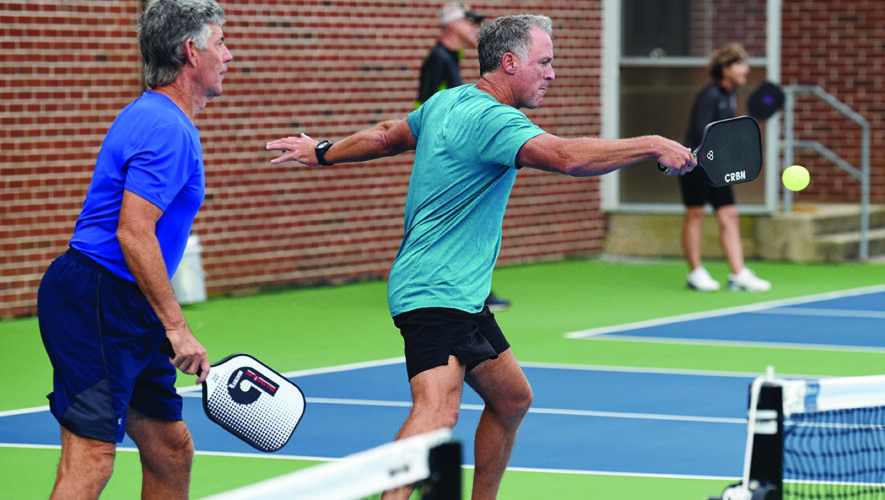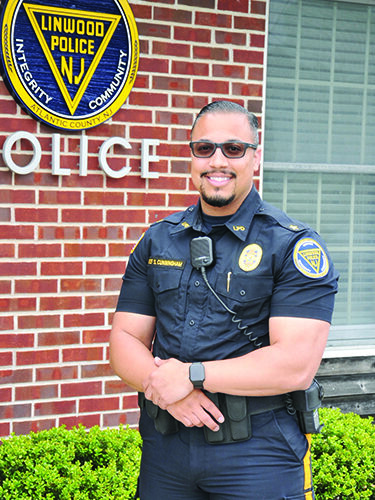Orthopedic surgeon has tips to keep players safe, whether novice or master
SOMERS POINT — With pickleball’s popularity soaring and the (slightly) cooler post-Labor Day weather likely to bring even more people to the courts, a local orthopedic surgeon offers important tips on how to keep bodies — especially older bodies — free of injury.
Dr. Dante Marconi has advice from proper warmup and using the right equipment to knowing your limits and listening to your body to prevent injuries.
Marconi is an orthopedic surgeon with Shore Physicians Group who specializes in sports medicine and shoulder surgery with an emphasis on diagnosing and treating a wide range of patients with sports-related and other injuries, such as acute and chronic joint ailments. His doctor of medicine is from the Drexel University College of Medicine. He is affiliated with Shore Medical Center in Somers Point.
Marconi first heard about pickleball when he was in Houston during a sports fellowship in 2020 and started seeing related injuries.
“I thought, ‘What is this game here?’ I had to search into it and once I heard about it for the first time I started hearing it more and more after that,” he said.
He started with Shore Physicians Group last October and began seeing pickelball-related injuries this past spring when the weather warmed up.
The injuries fit into his professional wheelhouse.
“As a sports surgeon, I spend time on sidelines so I have to be able to manage basically all acute injuries,” he said. “While I may not do surgery on all of them, I know how to initially see them, stabilize them, get the right diagnosis, the right treatment and get them to the right place.”
Preventing injuries
Preventing injuries, he said, starts at the very beginning.
“One of the biggest things of all activities, not specific to pickleball, is working your way up and getting the strength to be strong enough and conditioned to play the game.
“I stress a lot that fatigue causes the majority of the injuries and deconditioning, so it is important to have a good baseline before you get into significant competition,” Marconi said. “Sometimes your muscles aren’t conditioned to do the quick, explosive activities and that can put muscles, ligaments and tendons at risk.”
The next part of his advice is to warm up and stretch.
“Almost total body,” he suggested. “You do neck stretches, shoulder stretches, forearm stretches, hamstring, quad, ankle, calf, all that is crucial to prevent stiffness and to allow a good range of motion and stretch out the muscles.”
The doctor said it is important to have the right equipment as well.
“Obviously you don’t want to go out in sandals or sliders. You want good-fitting shoes. Nothing pickleball specific, but supportive sneakers, sometimes hightop that support ankles, but you definitely want good-fitting shoes that allow you to change direction and have support.”
Once playing, Dr. Marconi said it is important to have good technique, to know your limits and listen to your body.
“You want to have everything under control, stable balance, good core control, back control, arm control. All that helps decrease stress.
“A lot of times most injuries happen at the end of the sessions where they’re tired and trying to make the last point or get to the last ball. And just when you become tired, fatigued and dehydrated, that’s when you’re at significant risk,” he said.
“A lot of our older patients have even a little bit of arthritis. It’s good that they’re active, but sometimes certain pivoting, twisting, can cause some pain symptoms, or if you have a little muscle strain, that’s at risk of being injured further if you keep pushing it,” he said. “Sometimes your body really tells you that it’s time to stop, but the competitive nature and craze of this gets these patients to continue, which puts them at risk.”
Typical injuries
“Typically for the most part, the lower extremities,” he said is where he is seeing the most frequent injuries. “You worry about the Achilles, the ankle sprains. You definitely see foot fractures from rolling over the ankle and putting pressure on the foot. Those are kind of the key injuries, and then you have the chronic shoulder and arm injuries that you get — tendonitis and strains.”
Dehydration is a factor.
“Your muscles hold a lot of water and that kind of allows them to function well. Also, when you are dehydrated, you have less energy and that can put you at risk and have things not working right,” he said.
Even in a sport that many choose because it is enjoyable for amateurs and the inexperienced, Dr. Marconi said an injury can take you off the court for a while.
“Sometimes, depending on the injury, either the ligament or bone gets injured. Sometimes a mechanism that can cause an ankle sprain can cause a broken ankle. If you twist it enough or put the weight at the right area, the stress (is on) the bone instead of the ligament, causing a broken bone.”
There also are injuries to the shoulder rotator cuff.
“That is similar to the kind of strains of the upper body. You’re swinging a racket, you’re going overhead. A lot of this overhead, overuse activity can strain the rotator cuff. You can get certain strains or pains of those muscles,” he said.
He encourages people to be prepared.
“The reason people are so hyped on pickleball is because you don’t have to run too far. It’s enough to be active but not too stressful on the body, but sometimes that’s a misnomer that the game is completely safe. One step to the left or one step to the right could still cause injury, especially when you’re in a heated, competitive moment.”
The surgeon works on a range of patients.
“I’m trained in sports medicine, so I treat athletes of all ages and weekend warriors. I focus on the acute injury mainly, but also chronic pathology. Mostly all the extremities — the shoulder, elbow, hip, knee, ankle. Those are the surgeries I focus on,” he said. “In this practice I do shoulder replacement, but I do have a knee-replacement partner that I refer to at this time.”
He concluded by saying that being prepared and aware can help prevent injuries.
“It’s just understanding your limits and working your way into playing is the biggest thing to pick up on,” he said. “If you have any concerns, be seen by an orthopedic surgeon just to get checked up. We can give you information on full clearance, things to change, different ways to be able to get out there to perform at 100 percent.”
Dr. Marconi, originally from Blackwood, can be reached through Shore Physicians Group online at shorephysiciansgroup.com. He is at the Orthopedic Surgery and Sports Medicine office, second floor, 710 Centre St., Somers Point. Hours are8 a.m. to 5 p.m. Monday through Friday. Call (609) 365-6280.
By DAVID NAHAN/Sentinel staff



